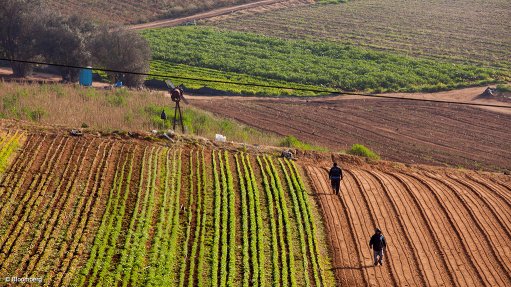
FARMING KNOWLEDGE
Knowledge and information flows improve farming, land use diversification and more robust agricultural value chains
Photo by: Bloomberg
The World Economic Forum's New Vision for Agriculture initiative is helping to develop support for smallholder farmers and larger farmers along existing infrastructure corridors in Africa to stimulate efficient agriculture value chains to support growth in local economies.
However, creating commercially successful farmers along these growth corridors requires the collaboration of all stakeholders, including government, local commercial farmers, farmer cooperatives, agricultural service com- panies and nongovernmental organisations.
Cost effectively developing more efficient farmers is necessary to ensure the sustainability and scalability of the agriculture value chains, as well as the development of agroprocessing, logistics and retail value chains, says seeds and agrochemicals multinational Syngenta Africa and Middle East corporate affairs head Kinyua M’Mbijjewe.
“Knowledge and information are two key criteria for successful farming, while access to viable markets is vitally important to create commercially sustainable farmers. “Demand and prices for produce across Africa will become increasingly robust owing to rising populations and incomes.”
This initiative is one of several collaborative initiatives to drive the development of agriculture and agriculture value chains throughout sub-Saharan Africa and is based on national agricultural priorities, supported by the Comprehensive African Agricultural Development Programme of the African Union.
“Agriculture value chains in many parts of Africa are fractured and inefficient. “To combat this, leveraging the knowledge of collaborative platforms that include private agricultural companies, public organisations and nongovern- mental organisations is necessary to enable increased yields and thus provide commercial sustainability, says M’Mbijjewe.
“Farming relies on knowledge and information flows regarding new seeds and crops, land use diversification, crop rotations, weather, agrochemicals, diseases, when to plant or harvest, crop prices and where and when to sell. “This makes communication, access to information and collaboration key to developing robust and sustainable agriculture in Africa.
“Syngenta takes this holistic approach and actively works to support farmers on the farm and beyond the farm. “We have solutions to improve crop potential, as well as to sup- port farmers’ cashflow and mitigate weather risk. “Smartphone applications, radio programmes and our technical support teams are some of the ways we provide farmers with detailed farming knowledge,” he says.
“Farmers also typically learn from one another and we have found a significant willingness to share information and experiences, with smaller, less technical, farmers able to learn from large-scale farmers.”
To improve market linkages and traceability, smaller farmers in some countries are producing crops that are aggregated by larger farmers and then exported or supplied to formal local markets.The smaller farmer gains technical and marketing support while the larger farmer benefits from economies of scale and having neighbouring farmers also succeed, which is good for a harmonious rural community.
Aggregation, consolidation and collaboration are significant trends shaping agriculture in Africa and worldwide. Syngenta has found this approach delivers significant development of agricultural and downstream industries, which are helping to grow the local and regional economies in Africa, concludes M’Mbijjewe.